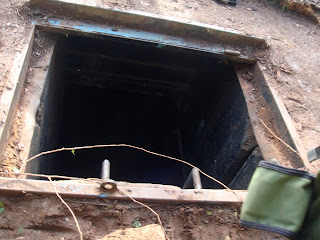

This past week I took part in the largest military exercise in the last 3 or 4 years. As a conclusion to the three month long training period there was an exercise in which the entire Paratroopers division, in collaboration with several other units, was tested in its wartime readiness.
The exercise was massive and I only saw the little bit in which I participated. There are four Airborne battalions (the 101st, the 202nd, 890th, and the Special Forces battalion) that participated in coordination throughout the week, each with somewhere around 500 people.
As an example of just how immense this drill was, the first day 90 helicopters flew 1,500 soldiers to their respective drop zones to begin the exercise, while simultaneously the 202nd battalion was brought in from the sea with the help of Shayetet 13 (the Israeli Navy Seal equivalent). I'm fairly certain that the budget for fuel alone must have been in the millions. To give a small example of how much money was put into this exercise, the enemy we were fighting was a third-party company that had been hired to simulate the enemy. We had been told that there had been an emphasis on orders to try and kidnap soldiers. It was actually kind of humorous because before we set out for the week our commander told us that if someone tries to kidnap us that we should physically fight back, his words were "I don't care if you have to knock their teeth out!" It was at that point that I decided to myself that apparently the commanders had been told if they lose any soldiers that they should probably expect some heavy handed punishments.
As a favor to me, and my still healing ankle, my commander told me that I would not be participating in my usual role as the light machine gunner this week. Seeing as it would mean carrying about 20 pounds less than I am accustomed to, I was thankful for commander's concern. Unfortunately, I still ended up carrying the stretcher for the team in addition to all of my regular food and gear, I guess sometimes being the only American in a group of scrawny Israelis has its disadvantages. The truth is the stretcher wasn't too heavy, but it took up a lot of space in my bag (we carry 90 liter bags that look something like this except green and not camo: http://uk.shopping.com/xPO-Alpine-Lowe-Alpine-Saracen-90-40-Liter-Military-Backpack) and because we had been told that it was going to rain all week we already had a lot of extra gear to take with us.
My team was in charge of leading our unit because we are trained in reconnaissance, whereas the rest of the teams are trained in anti-tank missiles. To aid us in the beginning of the exercise my team was joined by two dogs and their handlers. One was an attack dog and the other was a bomb/mine smelling dog. I had seen these dogs work in urban settings, but I was interested to see how they were utilized in open field combat like we would be simulating during the week. It actually turned into quite a fiasco. My team of 11, the two dogs and their handlers, along with everyones bag was helicoptered 30 minutes in a black hawk. We were dropped off behind the "enemy" and were hiking to a mountain in order to take the higher ground and clear the way for the other battalions to come in. When we came upon a wide clearing we were told to crouch down and wait for the attack dog to go out and do a quick search. A few minutes later the dog came running up to our sergeant and was jumping all over him. Fortunately for him, the dog was wearing a muzzle for the entire exercise. The handler came over and straightened it out after a minute or two, but this should have been a sign that this wasn't going to work.
After crossing the clearing we met up with the rest of our battalion (their helicopters had landed in a different zone) and began to lead the way to our destination. A few miles later our commanders again decided to send the attack dog out. This time, however, the dog apparently heard rustling coming from someone farther back in the group and ran after him. This is where the problem came about. Apparently, the people who weren't on our team did not realize that the dog had a muzzle on. They saw the dog attacking someone and assumed he was getting mauled. Someone fired a few shots in the air and others tried kicking or hitting the dog off. I don't really know why they thought the bullets would do anything because the dogs are trained for combat, but impressively (at least I was impressed) the dog was unfazed by the blows he was receiving. He only let up when his handler blew his dog whistle. Things calmed down a bit and a medic checked the dog out. He was fine, except for a small cut he got from running to his handler and nicking himself on some barbed wire. Needless to say, the dog experiment was done for this exercise. The dogs walked with us for the next few days, but only the bomb sniffing dog was sent out.







